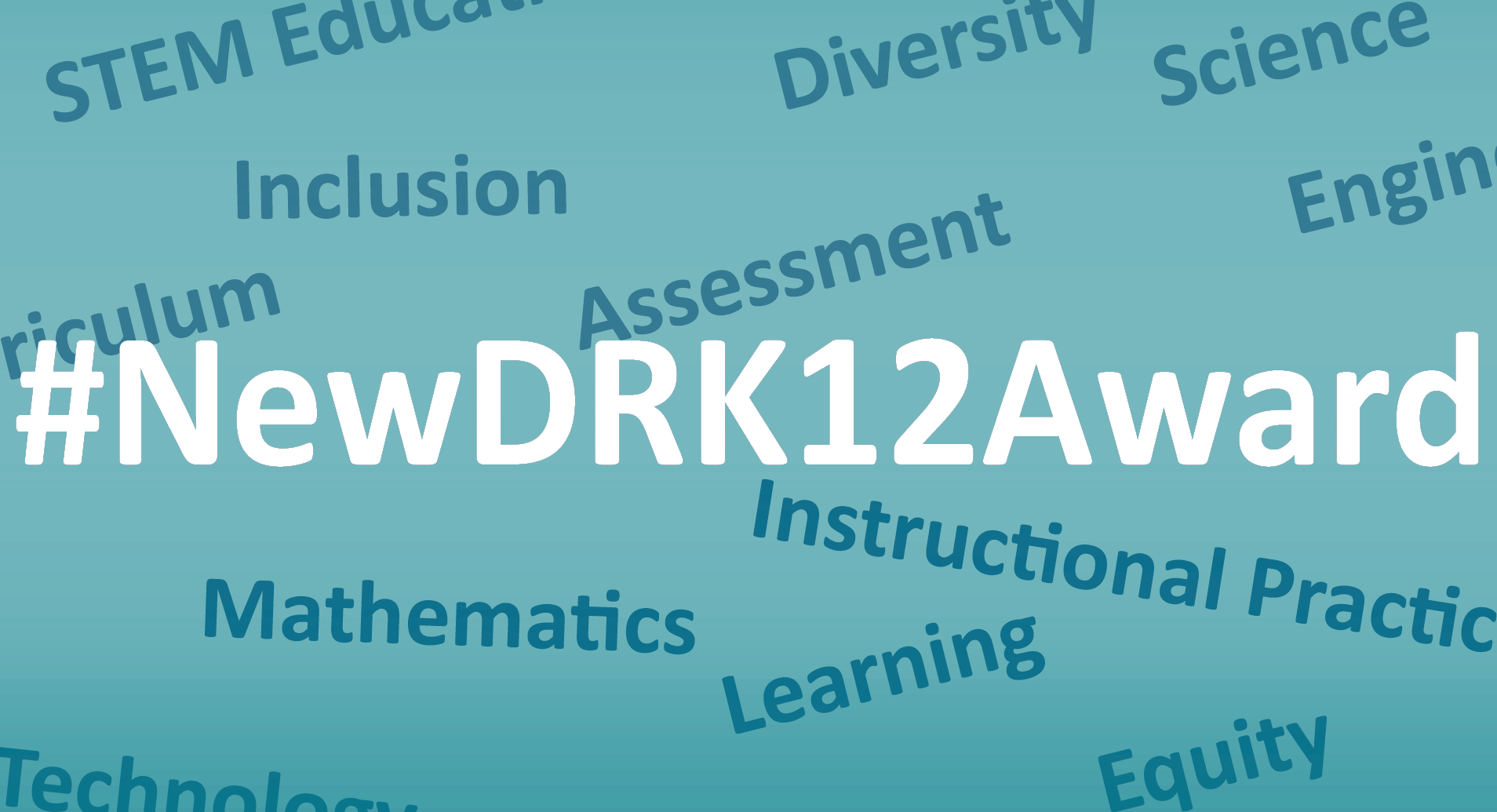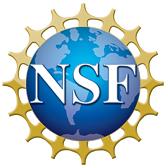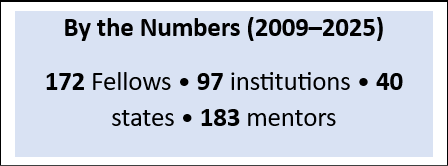Dear Colleagues,
While the DRK–12 Program is archived and will not accept new proposals, NSF continues to announce new DRK–12 awards from the 2024 solicitation. Meanwhile, those who might ordinarily submit a proposal to DRK–12 are encouraged to consider NSF’s new program, NSF STEM K–12.
NSF hosted a webinar earlier this month to provide an overview of FY2026 funding opportunities available through DRL and introduced the new NSF STEM K–12 Program. View the webinar recording (Passcode: KK..xiT7), slides, and a synthesis of the Q&A remarks. Please note: For proposals submitted on or after October 10, 2025, every individual listed as senior and/or key personnel must certify completion of compliant research security training within the preceding 12 months.
This month, in a Spotlight on Life Sciences Education, we highlight five DRK–12 projects that are reimagining how students and teachers engage with core ideas and practices in the life sciences—through rich data experiences, game-based inquiry, and modeling. Together they foreground evidence-based reasoning (from data analysis to argumentation), elevate crosscutting concepts such as sensemaking, and develop classroom-ready supports for teachers’ formative assessment.
With CADRE sunsetting, we will not offer a CADRE Fellows program this academic year. Thank you to all who have contributed to it since its inception—as nominators, Fellows, and mentors.
Best,
The CADRE Team
Life Sciences Education | Spotlight

In this Spotlight, we highlight innovations and research in life sciences teaching and learning. Five projects describe the specific subdisciplines and practices they focus on, unique challenges and opportunities they have observed in this field, the scientific and technological advances they are leveraging, and how they have incorporated ethical considerations into their work. The Spotlight also includes a list of additional DRK–12 projects, DRK–12 publications, and other resources related to life sciences education.
In this Spotlight:
- Featured Projects
- CAREER: Creatively Reimagining Engagements with Data in Biology Learning Environments (PI: Joshua Rosenberg)
- Developing an Online Game to Teach Middle School Students Science Research Practices in the Life Sciences (PIs: Ryan Baker, David Gagnon)
- Empowering Teachers to See and Support Student Use of Crosscutting Concepts in the Life Sciences (PI: Chad Gotch)
- Fostering Computational Thinking Through Neural Engineering Activities in High School Biology Classes (PI: Ido Davidesco)
- How Deep Structural Modeling Supports Learning with Big Ideas in Biology (PI: Daniel Capps, Jonathan Shemwell)
- Additional Projects
- Related Resources
New DRK–12 Awards | Project List

Since our August newsletter, additional DRK–12 projects have been funded. View the full list of recent awards below.
Congratulations to the newest DRK–12 awardees!
NSF FY2026 STEM K–12 Funding Webinar | Resources

On September 4, NSF hosted an informational webinar on the FY2026 funding opportunities available through the Division of Research on Learning in Formal and Informal Settings (EDU/DRL).
Program directors introduced the new NSF STEM K–12 Program and provided overviews of the Research on Innovative Technologies for Enhanced Learning (RITEL) and Innovative Technology Experiences for Students and Teachers (ITEST) programs, followed by Q&A.
Webinar Resources:
- Webinar Recording (Passcode: KK..xiT7)
- Webinar Presentation Slides
- Q&A (synthesized by CADRE)
172 Fellows, One Network: How CADRE Built Early Career Strength | Retrospective
As CADRE sunsets, we’re looking back at some of our programs and impacts, starting with the CADRE Fellows program.
What it was. From 2009 to 2025, the CADRE Fellows program provided a clear on-ramp for emerging scholars in DRK–12. It demystified NSF practices, connected diverse early career researchers to a national community, and accelerated their growth as collaborative contributors to the STEM education and research field.
 How it worked. Each cohort moved through sequenced experiences—monthly interactive webinars, peer collaboration, a writing project (manuscript, proposal concept, job materials, or business plan), and 1:1 mentoring. Fellows met NSF program officers, learned the review process, and participated in an NSF-style mock panel. The program culminated in an in-person convening with NSF staff and (in meeting years) the DRK–12 PI meeting, followed by reflection and entry into the alumni network.
How it worked. Each cohort moved through sequenced experiences—monthly interactive webinars, peer collaboration, a writing project (manuscript, proposal concept, job materials, or business plan), and 1:1 mentoring. Fellows met NSF program officers, learned the review process, and participated in an NSF-style mock panel. The program culminated in an in-person convening with NSF staff and (in meeting years) the DRK–12 PI meeting, followed by reflection and entry into the alumni network.
What it emphasized. Four recurring themes guided activities and resources:
- Career pathways (within and beyond academia)
- Dissemination and impact (writing, publishing, speaking)
- Networking and community (cohort and durable alumni ties)
- Funding research (from framing ideas to competitive NSF proposals)
CADRE tip sheets synthesized mentoring advice, so Fellows didn’t have to reinvent the wheel.
Adaptive by design. The program evolved in response to feedback and context: a postdoc cohort, a shortened timeline, larger cohorts, eligibility beyond DRK–12 projects, structured writing groups, and 1:1 mentoring. In 2025, CADRE tailored the cohort for scholars from EPSCoR jurisdictions and rural institutions, aligning with NSF’s call to expand opportunity while preserving the proven model.
 Reach and impact. By summer 2025, 172 early career researchers from 97 institutions across 40 states had taken part, supported by 183 mentors. Alumni went on to lead across K–12 systems, higher education, government, nonprofits, and industry. Many served as PIs on major grants; developed curricula, assessments, and professional-learning tools; launched district and/or state initiatives; informed policy; and brought learning-science expertise to ed-tech, thereby strengthening the STEM workforce. Participants reported clearer understanding of NSF funding and review, broader awareness of career options (including non-academic roles), greater confidence in professional discourse, and sharper writing/publishing practice. The peer community consistently stood out as a defining strength, with collaborations that extended well beyond the cohort year.
Reach and impact. By summer 2025, 172 early career researchers from 97 institutions across 40 states had taken part, supported by 183 mentors. Alumni went on to lead across K–12 systems, higher education, government, nonprofits, and industry. Many served as PIs on major grants; developed curricula, assessments, and professional-learning tools; launched district and/or state initiatives; informed policy; and brought learning-science expertise to ed-tech, thereby strengthening the STEM workforce. Participants reported clearer understanding of NSF funding and review, broader awareness of career options (including non-academic roles), greater confidence in professional discourse, and sharper writing/publishing practice. The peer community consistently stood out as a defining strength, with collaborations that extended well beyond the cohort year.
 Bottom line. As CADRE sunsets, the Fellows program leaves a durable legacy: an evidence-informed pathway that built people and ideas, strengthened the DRK–12 pipeline, and helped move rigorous, impactful STEM education research into practice.
Bottom line. As CADRE sunsets, the Fellows program leaves a durable legacy: an evidence-informed pathway that built people and ideas, strengthened the DRK–12 pipeline, and helped move rigorous, impactful STEM education research into practice.
We thank the many mentors who supported the Fellows throughout the years, those who nominated early career researchers for the program, and each Fellow who joined their peers in a commitment to improving preK–12 STEM education!
Project Tip: NSF STEM K–12 Solicitation Requirements |
|---|
Newsbites
News from NSF
- NSF’s Science and Engineering State Indicators data tool has been recently updated.
- NSF issued an important notice about updates to NSF Research Security Policies, including the research security training requirement for proposers and individuals identified as senior and/or key personnel, effective October 10, 2025.
- The National Science Board will next meet November 12–13. To learn more, sign up to receive updates by email.
News from DRK-12 Projects and Awardees
Awards & Recognition
Publications
- Building Instructional Capacity and Creating Opportunities for Professional Growth: Mathematics Professional Development for Paraeducators | Mathematics Teacher Educator
Authors: Karen Mutch-Jones and Judy Storeygard - Daylight Data: Deepening Earth Systems Understanding with CODAP Plugins | Science Scope
Authors: Leticia Perez, Frieda Reichsman, Sara Salisbury (2022 CADRE Fellow), Christina Chin, and Cynthia Mcintyre - Developing Prospective Teachers’ Language-Expansive Noticing | Science and Children
Authors: María González-Howard (2015–16 CADRE Fellow), Carla Robinson, Sage Andersen, Mariana Vazquez Esparza, and Nireyda Rodriguez - Discontinuities That Arise When Designing for Educational Improvement at State Scale | Frontiers in Education
Authors: Michelle Stephan, Allison McCulloch, Catherine Schwartz, Holt Wilson, and Katherine Mawhinney - Effects of Perceptual and Cognitive Factors on Preservice Teachers’ Professional Noticing: A Grounded Cognitive Perspective of Professional Noticing | ZDM – Mathematics Education
Authors: Karl W. Kosko, Maryam Zolfaghari, Richard E. Ferdig, Enrico Gandolfi, Christine K. Austin, Cornelius Pavlic, and Qiang Guan - Engineering Design for an Energy-Efficient One-Room Schoolhouse | Science Scope
Authors: Laura B. Cole, Laura Zangori, and Suzanne Otto - Enhancing Mathematical Instruction for Emergent Bilinguals Through Collaborative Situated Professional Development | The Journal of Mathematical Behavior
Authors: Jiyeong Yi, Jasmine Sourwine, and Shristi Shrestha - Entangled in the Chemical Industry: Honest Renderings of Corporate STEM Histories for Local Engagement in Civic Science | Science & Education
Authors: Daniel Morales-Doyle and Tomasz G. Rajski - How Teaching Practices Relate to Early Mathematics Competencies: A Non-Linear Modeling Perspective | Education Sciences
Authors: Yixiao Dong, Douglas H. Clements, Christina Mulcahy, and Julie Sarama - Leveraging Children’s Multicultural Literature to Support Students’ Math Identity and Problem Solving | Teaching for Excellence and Equity in Mathematics
Authors: Suzanne Abdelrahim, Margarita Jiménez-Silva, Rachel Restani, Robin Martin, and Tony Albano - Quantitative Reasoning in the Context of Science Phenomena | American Biology Teacher
Authors: Paul K. Strode, Louise S. Mead, Molly Stuhlsatz, Melissa K. Kjelvik (2018 CADRE Postdoc), Elizabeth H. Schultheis, Alexa R. Warwick, Audrey Mohan, Julie A. Morris, and Robert Mayes - Should We…? Embracing Justice-Oriented Climate Education in Elementary Science Teacher Preparation | Science and Children
Authors: Jessica Bautista and Elizabeth A. Davis - Solarizing Your School: Engineering Design in Students’ Authentic Epistemic Practices of Adopting Renewable Energy | Journal of Science Education and Technology
Authors: Hengtao Tang, Shiyan Jiang, and Charles Xie - Teacher Feedback Guiding Professional Development Programs: A 2-Year Field Trial Integrating Science and Language with Multilingual Learners | Journal of Science Teacher Education
Authors: Okhee Lee, Alison Haas, Abigail Schwenger, and Scott Grapin
Do you have news to share? Email cadre@edc.org.
Upcoming Opportunities
The following funding and publication opportunities, listed by deadline, may be of interest to you and your DRK-12 project members.
Funding

- Ongoing – NSF | NSF STEM K–12 (STEM K–12)
- October 2, 2025 – NSF | Advanced Technological Education (ATE)
- October 2, 2025 – NSF | EDU Core Research (ECR:Core)
- October 6, 2025 – AERA, NSF | AERA-NSF Dissertation and Research Grants
- October 21, 2025 – NSF | Historically Black Colleges and Universities - Excellence in Research (HBCU - EiR) (Full Proposal)
- November 4, 2025 – NSF | Research on Innovative Technologies for Enhanced Learning (RITEL)
- NEW! December 15, 2025 – Spencer Foundation | Small Research Grants on Education
- January 20, 2026 – NSF | National Science Foundation Translation to Practice (NSF TTP)
- February 27, 2026 – NSF | EHR Core Research: Building Capacity in STEM Education Research
- May 19, 2026 – NSF | National Science Foundation Translation to Practice (NSF TTP)
- June 1, 2026 – NSF | NSF EPSCoR Graduate Fellowship Program (EGFP)
- July 22, 2026 – NSF | Faculty Early Career Development Program (CAREER)
Publications
 September 30, 2025 – Connected Science Learning | Data, Data Everywhere!
September 30, 2025 – Connected Science Learning | Data, Data Everywhere!- September 30, 2025 – Frontiers in Education | Learning and Identity in Rural Communities Amid Sustainable Energy Transitions: Global Perspectives on Education and Place-Based Identity (Manuscript Summary Deadline)
- NEW! September 30, 2025 (Extended) – Review of Research in Education | Systematic Review Methods for Synthesizing Evidence from Diverse Approaches to Research to Inform Change Efforts in Complex Educational Systems (Call for Proposals)
- September 30, 2025 – ZDM – Mathematics Education | Gender, Psychology, and Mathematics Education
- October 1, 2025 – Journal of Chemical Education | Teaching Innovation in Materials Science and Engineering Design
- October 1, 2025 – Science & Children | Teaching Resources to Engage and Inspire
- October 1, 2025 – Science Scope | Earth Science Experiences
- October 1, 2025 – The Science Teacher | Rigorous Science Learning for Students with Disabilities
- NEW! October 2, 2025 – Investigations in Mathematics Learning | Defining, Cultivating, and Sustaining Productive Struggle in Mathematics Classrooms (Extended Abstract Deadline)
- October 20, 2025 – Frontiers in Education | Reconnecting Knowledge and Practice in Teaching and Teacher Education Through Multimodal Reflection (Manuscript Summary Deadline)
- October 31, 2025 – Educational Studies in Mathematics | Mathematics Education for Sustainable Futures
- October 31, 2025 – Mathematics Teacher: Learning and Teaching PK-12 | All Tasks Issue
- November 2, 2025 – Frontiers in Education | Artificial Intelligence in Educational Technology: Innovations, Impacts, and Future Directions (Manuscript Summary Deadline)
- November 2, 2025 – Frontiers in Education | Beyond Constructionism: Learning, Agency, and Design in the Age of Artificial Intelligence (Manuscript Summary Deadline)
- November 2, 2025 – Frontiers in Education | Human Factors and Design in Immersive and Generative Media Technologies (Manuscript Summary Deadline)
- NEW! November 3, 2025 – School Science and Mathematics | Research in STEM Research Partnerships
- November 15, 2025 – Journal of Research on Technology in Education | Promoting PK-12 Teachers’ AI Competencies: Practices and Challenges (Abstract Deadline)
- NEW! November 18, 2025 – Frontiers in Education | Generative AI Tools & Software for Education (Manuscript Summary Deadline)
- December 1, 2025 – Science & Children | What Is Science?
- December 1, 2025 – The Science Teacher | Science in Rural Spaces
- NEW! December 14, 2025 – Frontiers in Education | Artificial Intelligence and Universal Design for Learning: Empirical Pathways to Inclusive Education (Manuscript Summary Deadline)
- NEW! December 20, 2025 – Frontiers in Education | Advancing Pedagogy Through Innovation
- NEW! December 27, 2025 – Frontiers in Education | Beyond Proposals: Scientific Evidence and Policy Replication of Effective Strategies in Reducing Educational Inequality (Manuscript Summary Deadline)
- December 31, 2025 – International Journal of Science and Mathematics Education | Mathematics for and in STEM Education
- December 31, 2025 – Research in Science Education | Artificial Intelligence in Science Education
- December 31, 2025 – Research in Science Education | STEM and Teaching Engineering Design
- NEW! December 31, 2025 – ZDM – Mathematics Education | Capturing Mathematical Thinking and Learning Processes in Real Time (Abstract Deadline)
- January 1, 2026 (Extended) – Computer Applications in Engineering Education | Celebrating the 35th Anniversary of Scholarly Publishing and Impactful Contributions in Engineering Education
- NEW! January 15, 2026 – Frontiers in Education | Reconnecting Knowledge and Practice in Teaching and Teacher Education Through Multimodal Reflection (Manuscript Summary Deadline)
- February 1, 2026 – Science & Children | Celebrating Collaborations
- February 1, 2026 – The Science Teacher | Utilizing Discourse in the Science Classroom
- NEW! March 31, 2026 – Educational Studies | XR in Education: Multidisciplinary Insights for Supporting Learners with Additional Needs and Disabilities
- April 1, 2026 – The Science Teacher | Reaching Our Multilingual Learners
- June 1, 2026 – The Science Teacher | Social Justice and Advocacy in the Science Classroom
- June 30, 2026 – Research in Science Education | Research-Informed Policy and Practice in Science Education
- December 31, 2026 – Research in Science Education | Argumentation and the Problem of Misinformation in Science Education
- December 31, 2026 – Research in Science Education | Multimodal Literacies and Representations for Learning
 October 5, 2025 – 2026 ISLS Annual Meeting (Call for Papers)
October 5, 2025 – 2026 ISLS Annual Meeting (Call for Papers)- NEW! October 6, 2025 – 2026 ASCD Annual Conference (Call for Participation)
- NEW! October 6, 2025 – 2026 ISTE Annual Conference and Exposition (Call for Participation)
- NEW! October 7, 2025 (Extended) – 2026 NSTA National Conference (Call for Proposals)
- NEW! October 15, 2025 – 2026 ASEE Annual Conference (Call for Abstracts)
- NEW! November 1, 2025 – 2026 NCTM Annual Meeting & Exposition (Call for Proposals)
- November 10, 2025 – 2026 Biennial Conference on Chemical Education (Request for Programs)
- November 17, 2025 – 2026 SITE Conference (Call for Papers)
- NEW! January 1, 2026 – 16th IEEE Integrated STEM Education Conference (Call for Papers)
- January 5, 2026 – 2026 CSEDU International Conference (Call for Papers)
- January 20, 2026 – 2026 CSEDU International Conference (Call for Sessions)
- NEW! March 13, 2026 – 11th International STEM Education Conference (Call for Papers)
Career & Professional Development

- NEW! September 30, 2025 – Morgan State University, National Center for Elimination of Educational Disparities: Post-Doctoral Researcher
- October 1, 2025 – Stanford University, Graduate School of Education: Faculty Position in Education Data Science
- NEW! October 10, 2025 – Grand Valley State University: Assistant Professor of Mathematics Education
- NEW! October 22, 2025 – Studies in Science Education: Editor-in-Chief
- NEW! October 23, 2025 – University of California, Berkeley: Assistant Professor in Using AI and the Learning Sciences to Advance STEM Teaching and Learning
- NEW! October 31, 2025 – Wake Forest University: Assistant Professor of Mathematics Education
- November 30, 2025 – Computer Applications in Engineering Education: Associate Editor
- NEW! June 30, 2026 – University of California, Santa Cruz: Teaching Professor and Director of Teacher Education (Application review begins November 12, 2025)
- NEW! Until filled – Alabama A&M University, Department of Teacher Education and Leadership: Assistant/Associate of Educational Research
- Until filled – Brown University, Annenberg Institute: Senior Research Associate – The Rhode Island Education Research Collaborative
- NEW! Until filled – California State University, Northridge: Senior Strategist, STEAM Educational Programs (Application review began July 29, 2025)
- NEW! Until filled – Carroll College: Assistant Professor of Education (Application review begins December 15, 2025)
- NEW! Until filled – Dakota State University: Assistant Professor – Cyber Education
- Until filled – Fisk University, Education Department: Assistant/Associate Professor with STEM Education Focus
- NEW! Until filled – Georgia Southern University: Assistant Professor of Secondary Science Education (Application review begins October 23, 2025)
- NEW! Until filled – Georgia State University: Professor of Practice in Learning Sciences Innovation and Entrepreneurship (Application review begins December 1, 2025)
- Until filled – Indiana University: Assistant Professor of Foundations and Secondary Education with Expertise in Educational Research (Application review began April 9, 2025)
- NEW! Until filled – Indiana University Bloomington: Barbara B. Jacobs Endowed Chair & Director of the Center for Research on Learning and Technology (Application review begins October 20, 2025)
- Until filled – Longwood University: Assistant Professor of Mathematics Education
- NEW! Until filled – Metropolitan State University of Denver: Assistant Professor of Mathematics with Mathematics Education Specialty
- Until filled – National Louis University: Assistant Professor of Secondary Math Education
- Until filled – Navajo Technical University: Assistant Professor of Secondary Math Education
- NEW! Until filled – Neumann University: Assistant or Associate Professor – Quantitative/Qualitative Methodologist in Educational Leadership Doctoral Program
- NEW! Until filled – New Mexico Highlands University: Assistant or Associate Professor – Teacher Education Math and Science (STEM) (Application review begins November 1, 2025)
- NEW! Until filled – Old Dominion University: Assistant/Associate Professor of Secondary Mathematics Education (Application review begins November 1, 2025)
- Until filled – Pacific Lutheran University: Assistant Professor of Inclusive Education
- NEW! Until filled – Ramapo College of New Jersey: Assistant Professor of Teacher Education – STEM Methods
- NEW! Until filled – Saint Vincent College: Rita McGinley Endowed Chair in Early Learning and Children's Media (Application review begins October 30, 2025)
- Until filled – Santa Clara University, Center for Teaching Excellence: Director (Application review began July 15, 2025)
- Until filled – Southern Methodist University: Postdoctoral Fellow in Education Research (Application review began July 7, 2025)
- NEW! Until filled – SUNY Cortland: Assistant Professor of Educational Technology (Application review began September 24, 2025)
- Until filled – SUNY Old Westbury: Adjunct Instructor - Elementary Teacher Education
- NEW! Until filled – The University of Texas at Austin: Assistant, Associate, or Full Professor of AI in Learning and Education (Application review begins October 10, 2025)
- Until filled – Towson University: Visiting Assistant Professor of Mathematics Education
- Until filled – University of California, Santa Cruz: Supervisor of Teacher Education in Math and/or Science (Application review began June 16, 2025)
- NEW! Until filled – University of Cincinnati: Assistant Professor in Elementary/Middle Science Education (Application review begins November 15, 2025)
- NEW! Until filled – University of Cincinnati: Assistant Professor in Instructional Design and Technology (Application review begins October 15, 2025)
- NEW! Until filled – University of Georgia: Assistant Professor of Science Education (Application review begins October 20, 2025)
- NEW! Until filled – University of Houston: Assistant Professor in Science Education
- NEW! Until filled – University of Iowa: Assistant Professor in Learning Sciences and Educational Psychology
- NEW! Until filled – University of Kentucky: Assistant Professor of Educational Policy Studies & Evaluation, Quantitative Methods
- NEW! Until filled – University of La Verne: Professor of Practice for Instructional Design and Technology and Faculty Lead of the Center for Learning Innovation
- NEW! Until filled – University of South Carolina Upstate: Assistant or Associate Professor of Middle/Secondary Mathematics Education
- Until filled – University of Tennessee, Knoxville: Post-doctoral Research Associate – Educational Measurement and Statistics (Application review began August 20, 2025)
- NEW! Until filled – University of West Florida: Assistant Professor in Instructional Design and Technology (Application review begins October 1, 2025)
- NEW! Until filled – University of Wisconsin-Madison: Assistant or Associate Professor in Educational Policy Studies with Focus on Education, Environment, and Society (Application review begins November 12, 2025)
- NEW! Until filled – University of Wisconsin-Platteville: Assistant Professor of Mathematics Education (Application review begins October 23, 2025)
- NEW! Until filled – Utah Tech University: Instructor of Practice or Assistant Professor of Artificial Intelligence and Machine Learning (Application review begins October 20, 2025)
In Case You Missed It
Highlights from recent newsletters and announcements:
- 2025 DRK-12 PI Meeting | Updates
- Summer Reading List | 2024–25 DRK-12 Publications
- Project Tip: Telling Your DRK–12 Impact Story: How Projects Can Contribute to NSF’s Broader Narrative
- June Newsbites
A complete archive of our newsletters and announcements is available on cadrek12.org.